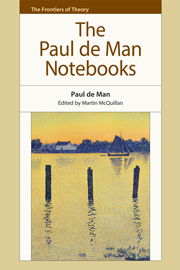Book contents
- Frontmatter
- Contents
- Series Editor's Preface
- Acknowledgements
- Dedication
- Introduction: ‘The Unimaginable Touch of Time’: The Public and Private in the Notebooks of Paul de Man
- PART I Texts
- PART II Translations
- 15 Hölderlin and the Essence of Poetry (1959)
- 16 Essay on the Origin of Language: Melody and Musical Imitation Are Being Considered
- PART III Teaching
- PART IV Research
- Appendix. The Notebooks of Paul de Man 1963–83
- Bibliography
- Index of Names
16 - Essay on the Origin of Language: Melody and Musical Imitation Are Being Considered
from PART II - Translations
Published online by Cambridge University Press: 05 December 2014
- Frontmatter
- Contents
- Series Editor's Preface
- Acknowledgements
- Dedication
- Introduction: ‘The Unimaginable Touch of Time’: The Public and Private in the Notebooks of Paul de Man
- PART I Texts
- PART II Translations
- 15 Hölderlin and the Essence of Poetry (1959)
- 16 Essay on the Origin of Language: Melody and Musical Imitation Are Being Considered
- PART III Teaching
- PART IV Research
- Appendix. The Notebooks of Paul de Man 1963–83
- Bibliography
- Index of Names
Summary
Of the Various Means of Conveying One's Thoughts
Speech sets man apart among animals, language distinguishes between nations: one knows where a man comes from only after he has spoken. Usage and need make that everyone learns the language of his country; but what is it that makes this language the language of his country and not of another? In order to tell, one must go back to an explanation that belongs specifically to the place and that predates even the local customs: speech, the first institution of society, owes its shape only to natural causes.
As soon as man was recognized by another similar to himself, as a being capable of feeling and of thought, the desire or the need to convey his feelings and his thoughts put him in search of the means to do so. These means could only stem from the senses, the only instruments through which a man can act upon another man. Hence the institution of sensory signs in order to express thought. The inventors of language did not reason this way, but instinct suggested this conclusion to them.
The general means by which we can act upon someone's senses are limited to two, namely motion and voice. The effect of motion is immediate in the case of touch or mediate in the case of gesture. Since the first is restricted by the length of one's arm it cannot communicate at a distance, but the other can reach as far as a lightning ray can travel.
- Type
- Chapter
- Information
- The Paul de Man Notebooks , pp. 183 - 224Publisher: Edinburgh University PressPrint publication year: 2014

